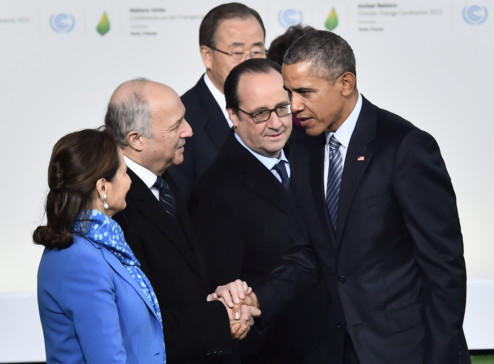
‘Paris will almost certainly not produce an ironclad, planet-saving agreement in two weeks. But it can succeed in an important way that earlier meetings have not — by fostering collective responsibility, a strong sense among countries large and small, rich and poor, that all must play a part in finding a global solution to a global problem,” said the New York Times in an editorial.
Referring to previous unsuccessful attempts at sealing a permanent climate deal, the newspaper was optimistic that there will be a breakthrough in Paris. “Kyoto failed because it imposed emissions reduction targets only on developed countries, giving developing nations like China, India and Brazil a free pass ... Copenhagen attracted wider participation, but it broke up in disarray, in part because of continuing frictions between the industrialised nations and the developing countries. The organisers of the Paris conference have learned a lot from past mistakes. Instead of pursuing a top-down agreement with mandated targets, they have asked every country to submit a national plan that lays out how and by how much they plan to reduce emissions in the years ahead. So far, more than 170 countries, accounting for over 90 per cent of global greenhouse emissions, have submitted pledges, and more may emerge in Paris,” it said.
The Sydney Morning Herald observed that while five years was a short time to measure global warming, it was enough to assess the politics of climate change. “The five-yearly reviews mooted for the Paris agreement are essential to holding global warming to 2 degrees above pre-industrial levels. Thus far, the pledges of nations only hold warming to 2.7 degrees, although that’s still better than the estimated 4-5 degree warming, should nations continue on current polluting paths. The hope is for a snowball effect as each nation offers more action to reach ever-increasing emission reductions targets,” it said.
The Guardian, meanwhile, highlighted the urgency of reaching a consensus in Paris. “The current front-runner for best slogan for the Paris climate change summit has to be ‘There is no planet B’. As for images, it is hard to imagine one more potent than the thousands of pairs of shoes laid in tidy lines in the Place de la Republique that symbolise the march climate activists had scheduled for Sunday then banned for fear of a repeat of the terrorist attack of a fortnight ago. However equivocal some of the political leadership sometimes appears, the popular movement for greening the economy is in good heart,” the newspaper said in an editorial.
The Toronto Star zeroed in on Canada’s expectations from the climate summit and said: “It’s safe to say that Canadians didn’t sweep Prime Minister Justin Trudeau’s Liberals into office on the strength of their climate policy. Their green agenda was long on good intentions and short on specifics. Still, expectations are high.”
In India, one of the nations squarely blamed for the collapse of a deal in Copenhagen, the Hindu newspaper said in an editorial: “The Paris climate change conference could become a landmark summit in the history of world development, if leaders of the rich nations show the vision to come up with a just and equitable agreement that supports carbon-free growth.”





_resources1_16a31069e4e_small.jpg)






